On a muddy road in Brekoc village, just outside Gjakova, journalist Nora Xhuzi arrives at Mira Jakupi’s yard. A portable container home, barely 10 square meters in size, sits in the yard. This is where Jakupi and her six-member family have lived for the past two years. For them, that container serves as a living room, kitchen, bedroom and bathroom for their four children. The metal ceiling is supported by a wooden pole in the middle of the room.
“We barely have room to fall asleep,” said Jakupi.
“Here, see it with your own eyes,” said Xhuzi to me, standing in front of the open door.
“Is there any news about the houses?” Jakupi asked Xhuzi, referring to the protracted application process for building houses for homeless families from minority communities. But the Ministry of Local Government Administration has not yet responded to any of their inquiries. Xhuzi mentions her mother-in-law, Hyra, who was told by the doctors that she must remove one of her kidneys, adding to Xhuzi’s worries. Jakupi stands behind the barbed wire fence, while Xhuzi with her hands on her waist, listens to her on the side of the road.
“It is difficult in these situations to contain your emotions. When you see a mother or an elderly woman crying in front of you, who sees you as their only hope… you can’t remain indifferent,” said Xhuzi.
Since 2019, Xhuzi has hosted the “Ora Egjiptiane” show on Radio Television of Kosovo (RTK), which focuses on Kosovo’s Egyptian community. Throughout this time, the show has often been the primary venue for members of this community to voice their concerns and address their needs.
“It has happened to me once that I found myself unable to ask my interview questions, because the children were begging me for something,” Xhuzi recalled, speaking to Jakupi as she was surrounded by her four children, in the flooded yard from the early spring rains.
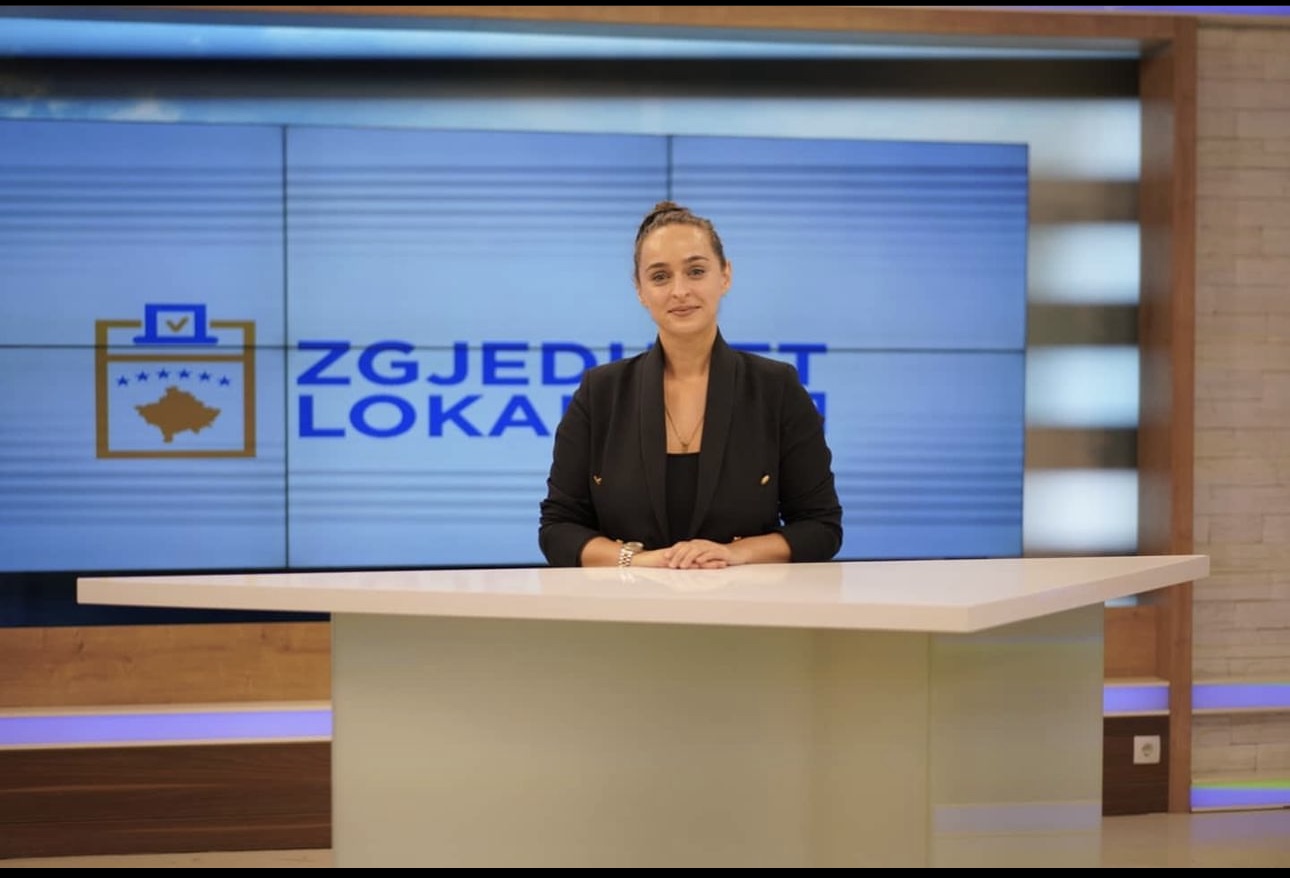
Since 2019, Xhuzi has hosted the show Ora Egjiptiane on RTK. Photo: Courtesy of Nora Xhuzi.
37-year-old Xhuzi developed a passion for journalism during her high school years, 2003 to 2005, in the multi-ethnic city of Prizren. An additional driving force was the fact that as a journalist, she could become a powerful voice for the concerns of the Egyptian community and for others.
“There were no other reasons. I realized that many young girls and young boys saw me as a support and as a role model, that you should not be ashamed of who you are,” said Xhuzi during the journey from Gjakova to Prizren. Despite growing up in a multi-ethnic city, Xhuzi recalls experiencing discrimination, from how she was treated in the education system to her everyday life. But she never gave up.
Little Selamir’s big dream
Selamir Qerimi had big dreams while growing up in Magure, Lipjan.
Today, 27-year-old Qerimi has about five years of work experience as a journalist, but in his youth, he was consumed by a single grand ambition — to proudly represent the colors of FC Barcelona. Even though he didn’t play with his neighborhood friends who played with a ball up and down the dusty streets, he never stopped practicing. Instead, he would spend his time alone, kicking a ball around in the yard.
“However, I had imaginary friends with whom I played,” said Qerimi, recalling more than two decades ago. Despite the challenges he faced as a child after returning from North Macedonia as a war refugee, he believed that one day he would play in Barcelona’s stadium, Camp Nou.
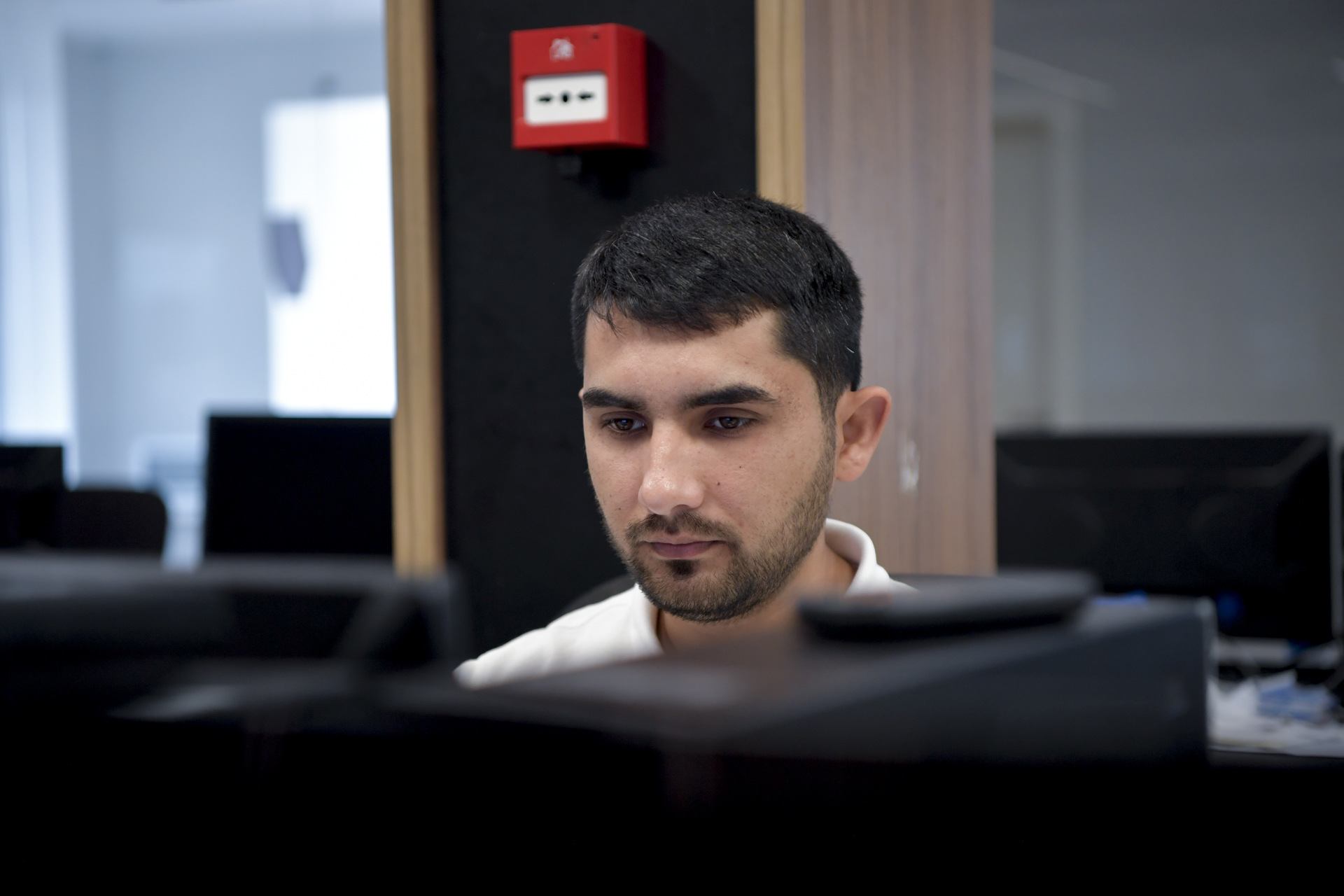
Selamir Qerimi has worked as a journalist for five years now. Photo: Atdhe Mulla / K2.0
In North Macedonia, the eight members of the Qerimi family lived in plastic tents in Stankovec. Qerimi was just a child at the time and has learned about that period through stories his family have told. “Grandfather, grandmother, my parents, two aunts, my brother and I stayed in a one-room tent,” said Qerimi, who was too young to walk at that time. “It was completely improvised. We had built a bathroom on our own, it was all improvised.”
Qerimi said that finding food was not a challenge because international humanitarian organizations helped. “Our relatives in Germany also helped us. The problem was housing,” he said.
After the closure of the refugee camp in Stankovec and the return of most refugees to Kosovo after the end of the war, the Qerimi family had nowhere to go. Their house had been burned down. They settled in the Shutka municipality in Skopje, the only municipality with a Roma majority. “Here the conditions were a bit better. A half-house: a shack consisting of two rooms, a corridor and a bathroom,” said Qerimi.
In 2001, the family moved temporarily to Fushë Kosovë, where they rented before returning to Magure, after they rebuilt their house. According to Selamir’s father Lulzim Qerimi, who is the deputy mayor of the municipality, present-day Magure has about 400 houses, almost 50 of which belong to Ashkali and Roma citizens. However, the number of families in Magure today is decreasing as people are moving to other places in and outside of Kosovo. On warmer days, there is more life in the village, which usually resembles a gloomy Albanian mining town. Magure did not manage to recover economically after the radical political and economic changes. Once Magure was full of miners’ families.
On the school playing field, children from different communities gathered with the shared goal of winning a soccer match. During his childhood, Qerimi avoided joining the soccer games where sometimes, thoughtless words that could be hurtful were said.
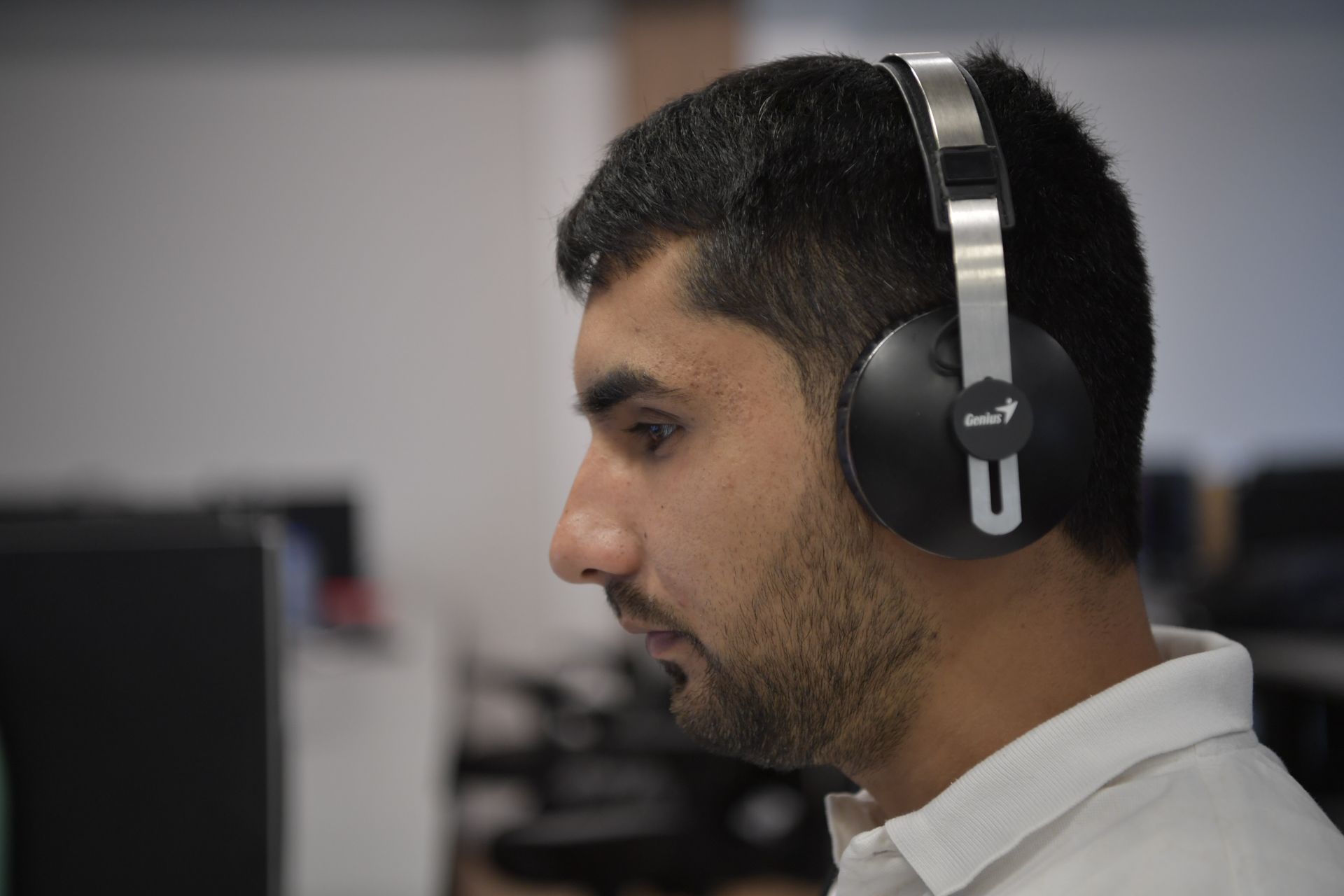
As a child, Qerimi dreamed of playing at the Camp Nou stadium in Barcelona. Photo: Atdhe Mulla / K2.0
“There were instances when people used derogatory terms, maybe unconsciously, maybe it was words that they heard at home,” said Qerimi, adding that there were also Albanian classmates who supported their peers from his community. Qerimi attributes the discrimination he experienced as a child to the unconscious racism among Albanian children. He believes that these children had normalized racist expressions, failing to consider the consequences and impact they could have on the members of the Roma and Ashkali communities.
Financially, the Qerimi family primarily relied on the father’s work as an electrician. Lulzim, the father, had to take on jobs in different places across Kosovo, which meant further expenses for food and travel. The lack of income regular enough to cover travel expenses and the monthly cost of football schools outside Lipjan pushed Qerimi to give up his childhood ambitions of being a footballer.
But another dream began to come true years later, when Qerimi graduated from the Journalism Department at the University of Prishtina.
On the day before the admission deadline for the 2016 to 2017 academic year, Qerimi listened closely to his father’s advice.
“Dad said to me: ‘Why don’t you apply for journalism?’ Then I thought, even when I was little, I liked when my father’s uncle brought us newspapers. But I didn’t read politics, I used to read the newspaper’s last page — I enjoyed sports and doing crosswords.”
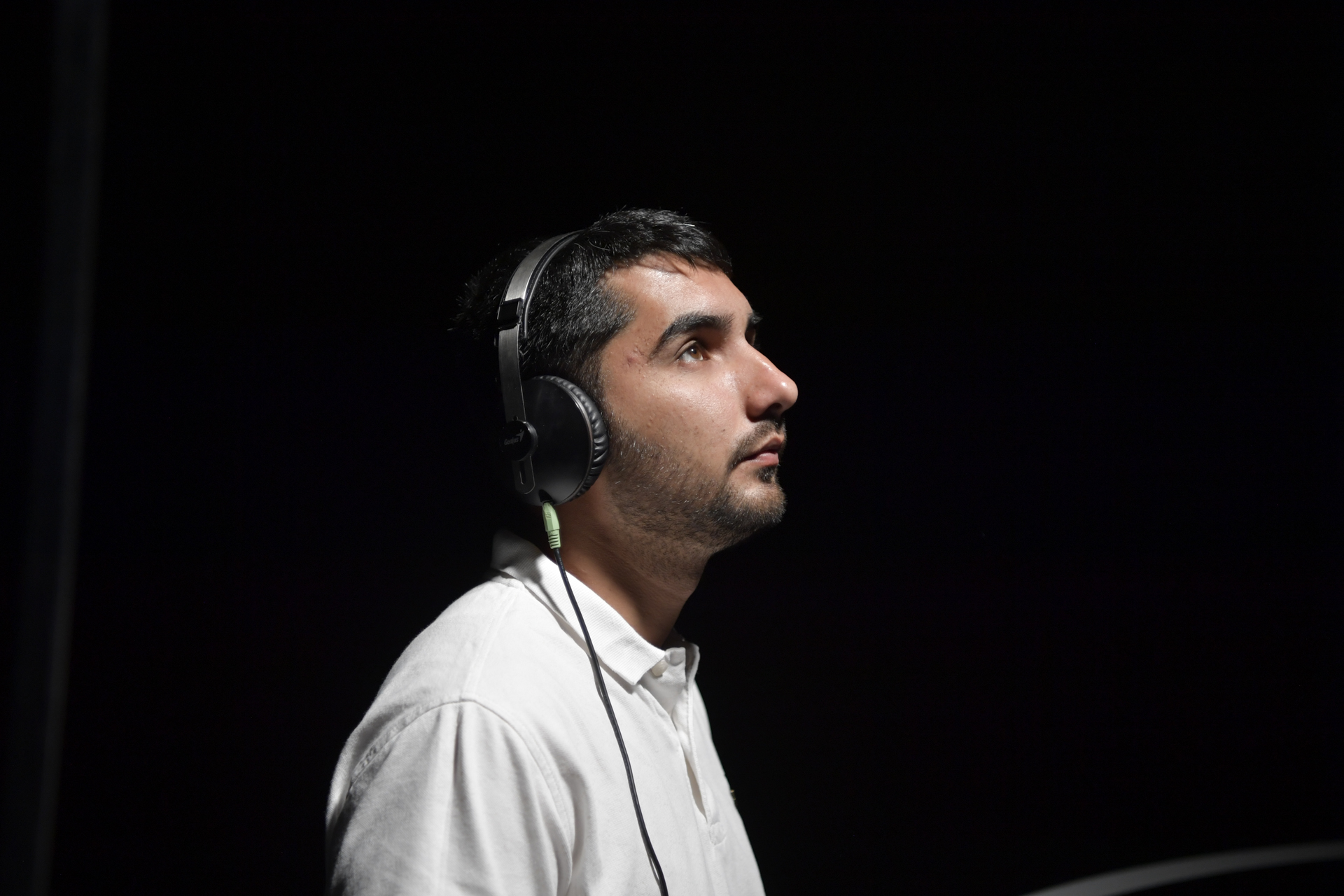
Qerimi had never thought of journalism as a profession. Photo: Atdhe Mulla/K2.0
In addition to his father’s support, the guidance of Fatmir Grajqevci, a philosophy teacher at the Ulpiana high school in Lipjan, where Qerimi attended high school, was crucial. Qerimi even remembered his professor during the entry exam for the Department of Journalism, where potential candidates were asked to write an essay.
“I remember that the essay was about the influence of social media and I knew that part would be assessed with the most points,” he recalls, relating the story of his acceptance to university with a homework assignment from years before. Grajqevci had assigned his class to write an opinion piece about domestic violence in groups.
“He also told us ‘when you come to class next week, each group will read their assignment out loud and we will announce the best group.'” When the next week came, none of the groups had completed the assignment. “But I remember that we had philosophy in the third class that day, and in the first hour we said to each-other in the group: ‘Have we done it? No we haven’t. What are we going to do?’ I said: ‘I will take over and write it.'”
During the two hours of his Albanian language class, Qerimi was not paying attention to his professor. Instead, he was writing down his thoughts on the importance of collective awareness in the fight against domestic violence.
His friend, Egzon, then read the assignment to the class. “The professor said: ‘Who did this?’ I still thought we messed up somewhere. Egzon said: ‘We worked on it all together, professor.’ ‘No,’ said the professor, ‘there was probably someone who did the most,'” recalled Qerimi with a laugh.
Qerimi keeps in touch with professor Grajqevci to this day and they meet at least twice a year.
“Qerimi never used pointless words when answering,” recalled Grajqevci. “I told him that it was an exceptional essay. He fascinated me. He deserved it and then he realized that writing essays and writing in general could work out, because his professor gave him a good grade.”
“If someone would say to me back there ‘take the mic and go ask questions at the square,’ I would have never believed them,” said Qerimi.
Romano Avazo — an oasis of Roma culture in Kosovo
In Prizren, the Romano Avazo [Voice of the Roma] radio station has become the main media outlet for the Roma community. Fatmir Menekshe, both an editor and director of the nongovernmental organization Durmish Asllano, which serves as the focal point for Roma cultural organizations in Prizren, is not sure about the year, but insists that the first Roma broadcasts on Radio Television of Prishtina (RTP) were the first in the Romani language in all European radio stations.
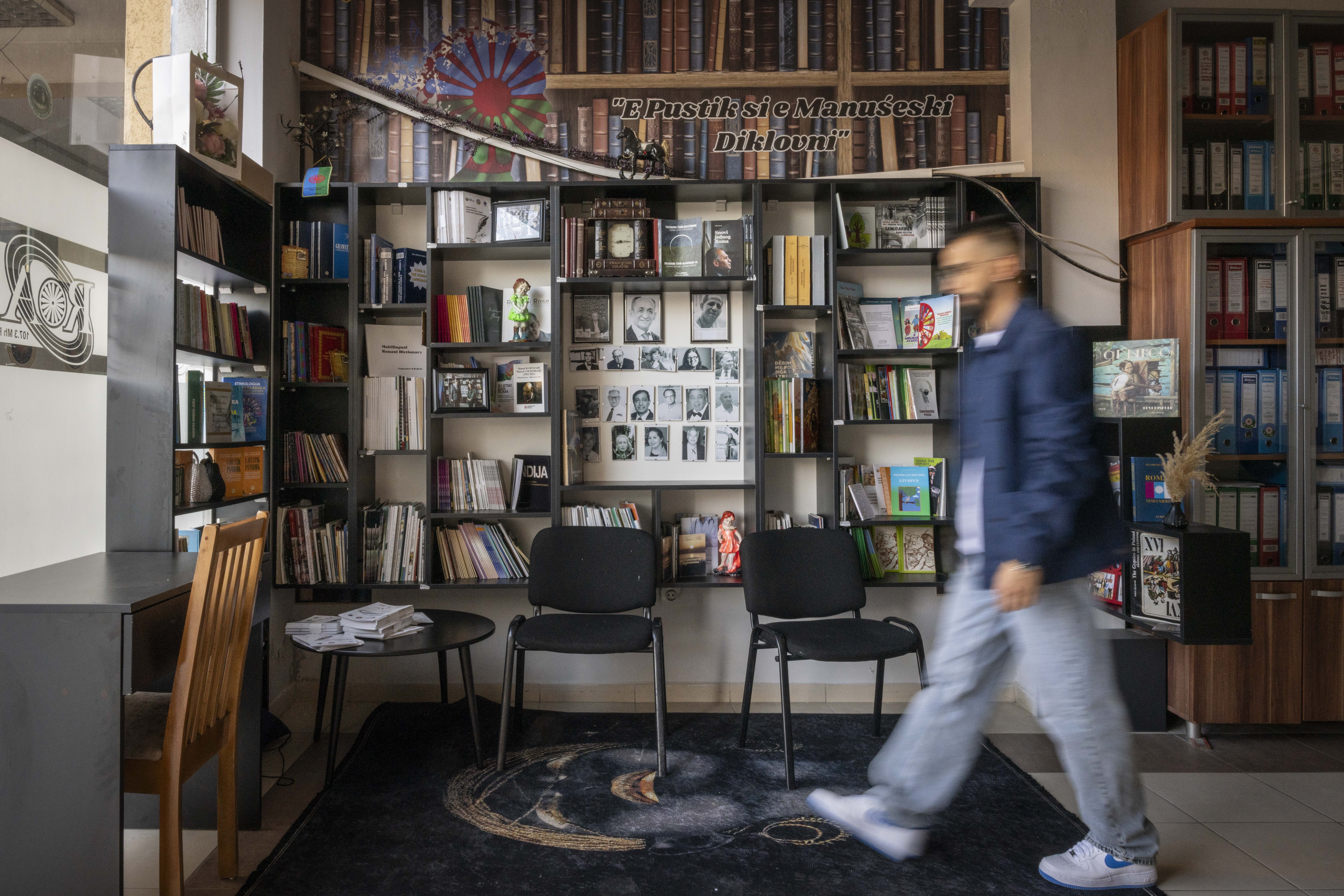
Durmish Asllano, a nongovernmental organization, is the axis of Roma cultural organizations in Prizren. Photo: Majlinda Hoxha.
Menekshe and his colleague Sejnur Veshall have been involved with Romano Avazo since they were in elementary school. Veshall returned to Durmish Asllano in 2022 as program manager after being relieved of his duties as Deputy Minister of Culture in July of that year. Menekshe and Veshall say that many Roma individuals have made significant contributions in Kosovo and the former Yugoslavia, promoting and preserving Roma traditions and culture. Among these were renowned Roma intellectuals, such as the late poet and Deputy of the Assembly, Kujtim Paçaku, the late playwright and activist, Nexhip Menekshe, who the Roma amateur theater of Prizren is named after. There are also figures such as university professor Ibrahim Elshani, author and translator Selajtin Kryeziu and researcher Ibrahim Karanxha.
“As a craft, it became a treasured profession for the intellectuals of that time to raise their voices, to write to preserve the language and to inform their community,” said Menekshe in Romano Avazo’s editorial office in Prizren. “Even today, almost every Roma intellectual is also a journalist.”
Menekshe said that Nusret Saharsoj, the founder of the cultural and artistic society, was a journalist at RTP and served as a correspondent in Belgrade. Being an Albanologist, he also held shows in the Albanian language.
Manekshe keeps a copy of the magazine Romano allav [The Roma word] in his office, published in 1992 by Durmish Asllano. “This is number three. This means that there were other editions before 1992,” said Manekshe, while slowly starting to flick through the pages. Paçaku, Kryeziu, Karanxha, Elshani and Njazi Çollaku were part of the editorial team. 500 copies were published.
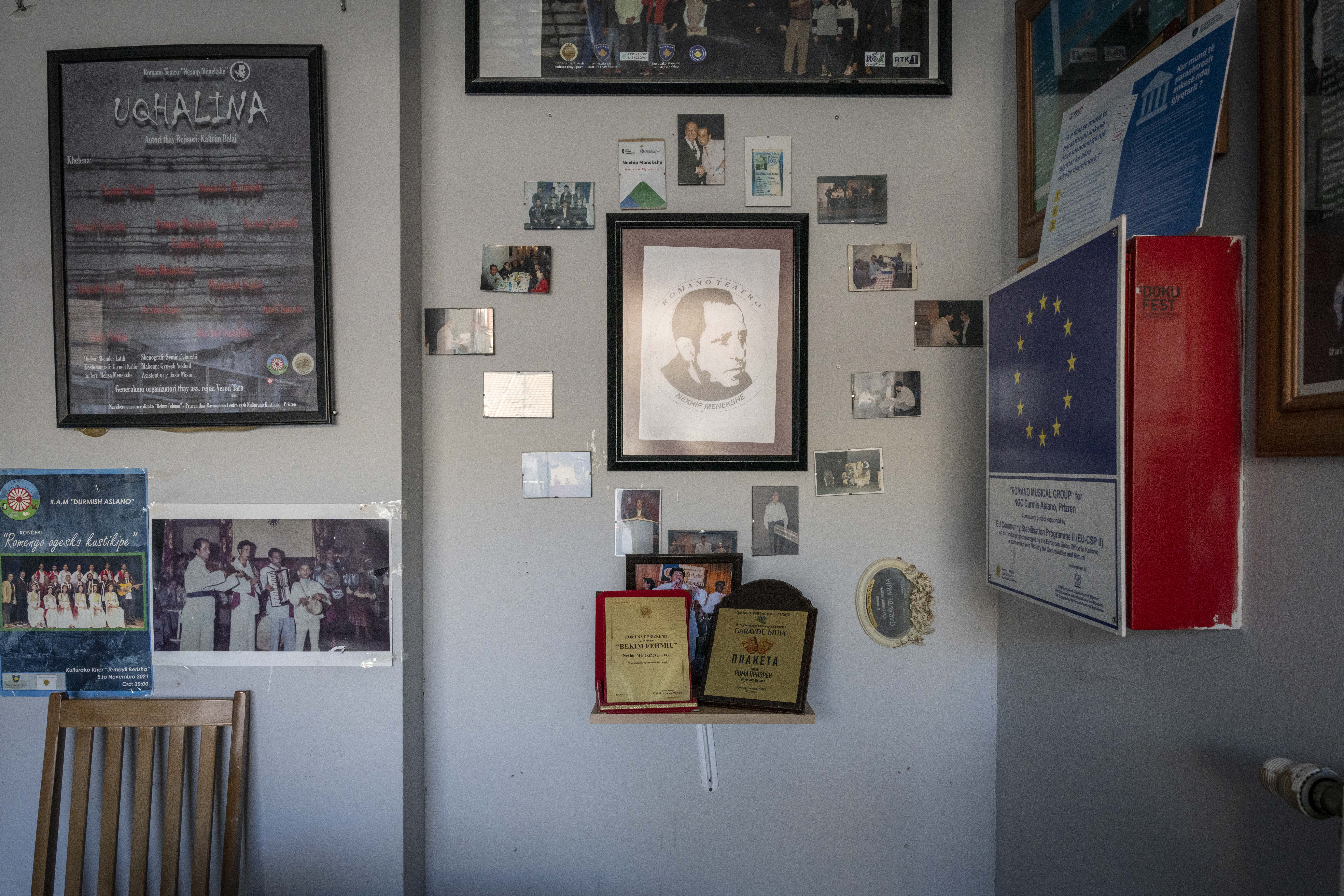
Many Roma intellectuals have contributed to preserving and promoting Roma culture. Photo: Majlinda Hoxha / K2.0
The magazine begins with the lyrics and notes to the song, “Gelem Gelem,” composed by Serbian Roma singer Žarko Jovanović, often used as a Roma anthem. Then there is the 25-letter alphabet. “So in most cases, whatever we publish, we also publish it in the official language,” he said, referring to Albanian. “Even when the official language was Serbian, they published the text in both the Romani language and Serbian,” said Manekshe.
“Romengi buqi” talks about Roma life. The “Romane egipçajna” shows how in some countries the Roma are known as Egyptians. Manekshe read another article in the Romani about “the similarity of the Romani language with the language of India.”
Manekshe and Veshall were elementary students when they took over the management of the show “Sporti, ne dhe ju” in Romano Avazo, founded in 2007 by playwright Nexhip Menekshe. Veshall is proud that almost all of Prizren’s Roma politicians and intellectuals have worked and passed through the doors of Romano Avazo, which broadcasts music and shows in the Romani language 24 hours a day.
Success stories
Xhuzi devotes her time to work on shows that tell the stories of successful members from her community. Although she mentioned that there are editors who want her to focus on stories that portray minority communities in difficult living conditions, Xhuzi believes that this dominant approach in the Kosovar media should be changed and that poverty is currently the main lens through which Roma, Ashkali and Egyptians are portrayed. She said that each community has traditions and values, which not only distinguish them from others, but also enrich the culture of the country as a whole. This side is less often portrayed in Albanian language media.
Xhuzi, speaking to young people from the Roma, Ashkali and Egyptian communities in Gjakova in a lecture organized by Reporteri.net earlier this year on the importance of media education, said that “The media is considered as the fourth power to reflect not only the negative sides of the community, but also to show successes stories from over the years.”
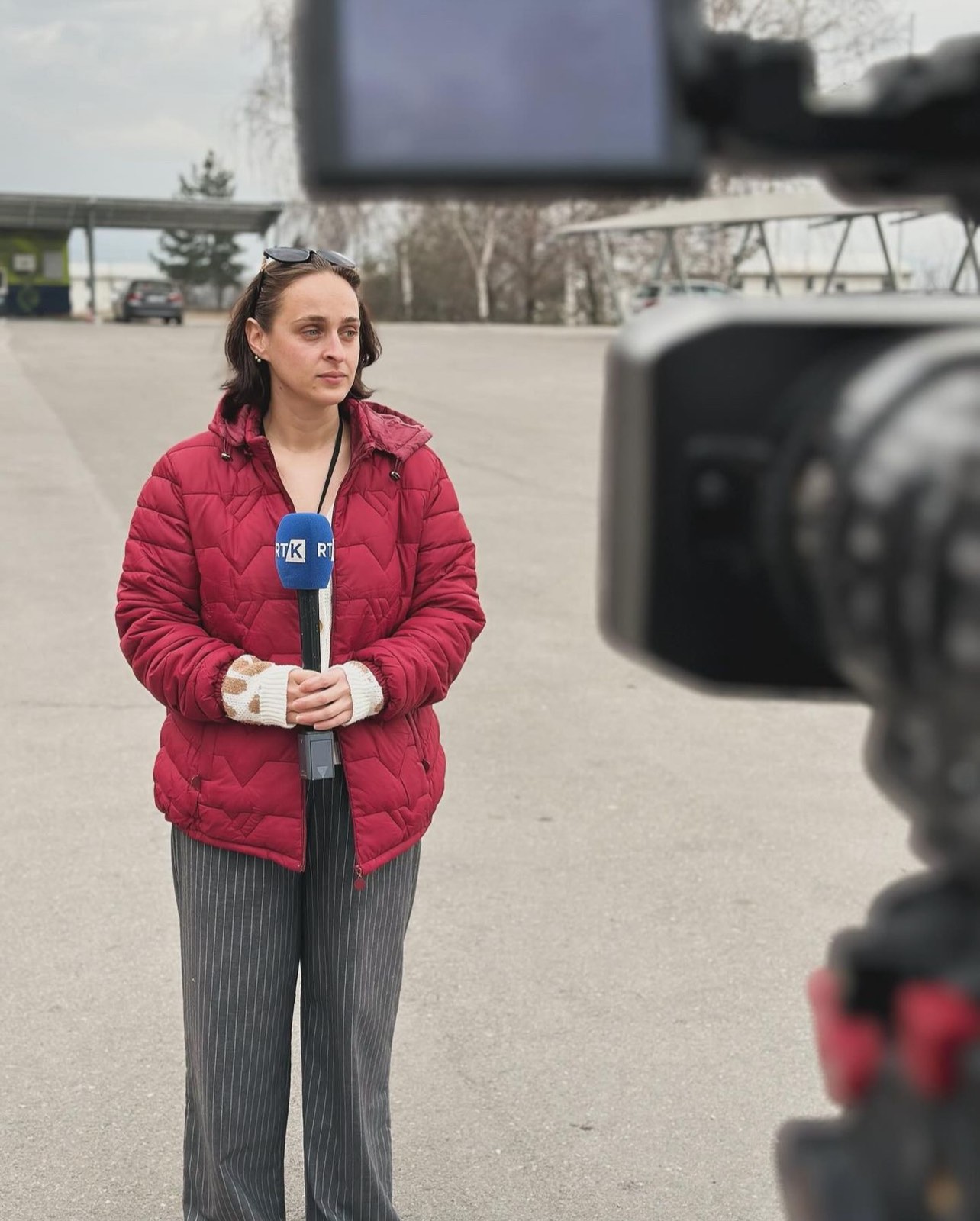
Nora wants to change the way her community is portrayed in the media. Photo: Courtesy of Nora Xhuzi.
On February 19, 2024, RTK’s central editorial office in Prishtina contacted Xhuzi to cover the suspicious death of a four-year-old girl from the Egyptian community. The girl, who was from Gjakova, died at the University Clinical Center in Kosovo two days after being taken there from the General Hospital of Gjakova. The case immediately garnered public attention due to the ambiguity and conflicting statements surrounding the circumstances of her death. There were suspicions that the case was neglected because of the four-year-old’s ethnicity.
The editors instructed Xhuzi to include in the new report’s introduction that the father of the deceased, Haxhi Shala, was collecting cans when he heard the news. This directive aimed to align with the narrative that media outlets often choose when producing content for the Roma, Ashkali and Egyptian communities.
Xhuzi met Haxhiu after visiting the Koloni neighborhood in Gjakova. He told her that he did not have the money to travel to Prishtina in order to get his daughter’s death certificate.
Xhuzi said that despite the personal successes that individuals from minority communities may have achieved, they have not completely won the fight against prejudice against their community. According to her, this makes members of these communities hesitant to participate in public life, adding that journalists and media outlets in the Albanian language should be even more vocal in efforts to fight racial and ethnic prejudices.
The Ombudsperson Institution of Kosovo highlighted the danger of hate speech in public discourse, especially on social media, in its report on prevention of hate speech from this year. Groups such as the Roma, Ashkali and Egyptian communities continue to be one of the main targets of these attacks.
“I think that the mainstream television channels should deal with these communities’ political issues,” said Veshall from Durmish Asllano. “To invite people, to invite Fatmir, to talk about civil society, then discussion would start to grow. We have an enigma surrounding these communities, they are less known.”

Editor-in-chief of Reporteri Mentor Gjergjaj is working on finalizing the platform Factorial, dedicated to non-majority communities.
Online media outlet Reporteri, in addition to hosting a training on information disorder for 125 young people, many of whom were from minority communities, has launched a platform completely dedicated to these communities. Reporteri selected six of the participants to work on this platform, which is called Factorial. This opportunity will enable them to gain hands-on experience with the aim of becoming future media professionals in Kosovo.
“In this platform, readers will be able to express their views through special columns that provide space for the voice of Roma, Ashkali and Egyptian citizens to be heard,” said Mentor Gjergjaj, editor-in-chief of Reporteri.
In an interesting twist of fate, this platform will be managed by Qerimi, whose journalistic career started with an email.
The email of opportunities
Before his graduation ceremony in 2019, Qerimi wrote an email to journalist Vehbi Kajtazi, who was then co-founder of the online media outlet Insajderi. Qerimi met Kajtazi on graduation day. “When I entered the labor market, I saw that it works a little differently,” said Qerimi. “I think it was the best experience, because my first experience was at a good school.”
He worked there for over a year before moving to civil society, taking up a position in the media relations office of a nongovernmental organization. But somehow this job didn’t suit him. “I didn’t like it much because it was very bureaucratic work, even though I did a lot of networking. But then I saw my friends that worked in media outlets, and I used to say to myself: ‘Look at them, and then look at me,'” said Qerimi.
In February 2021, he decided to resign from his position without having lined up another job. “I was sure that I would find a job in the media, but I needed a little rest,” he said.
Even amid the noise of a sports car driving on the main road in Magure does not distract Qerimi from telling his story. An email he wrote to Arsim Lani led to Lani, the editor-in-chief of T7 TV, inviting him to a meeting on a Thursday in early March 2021.
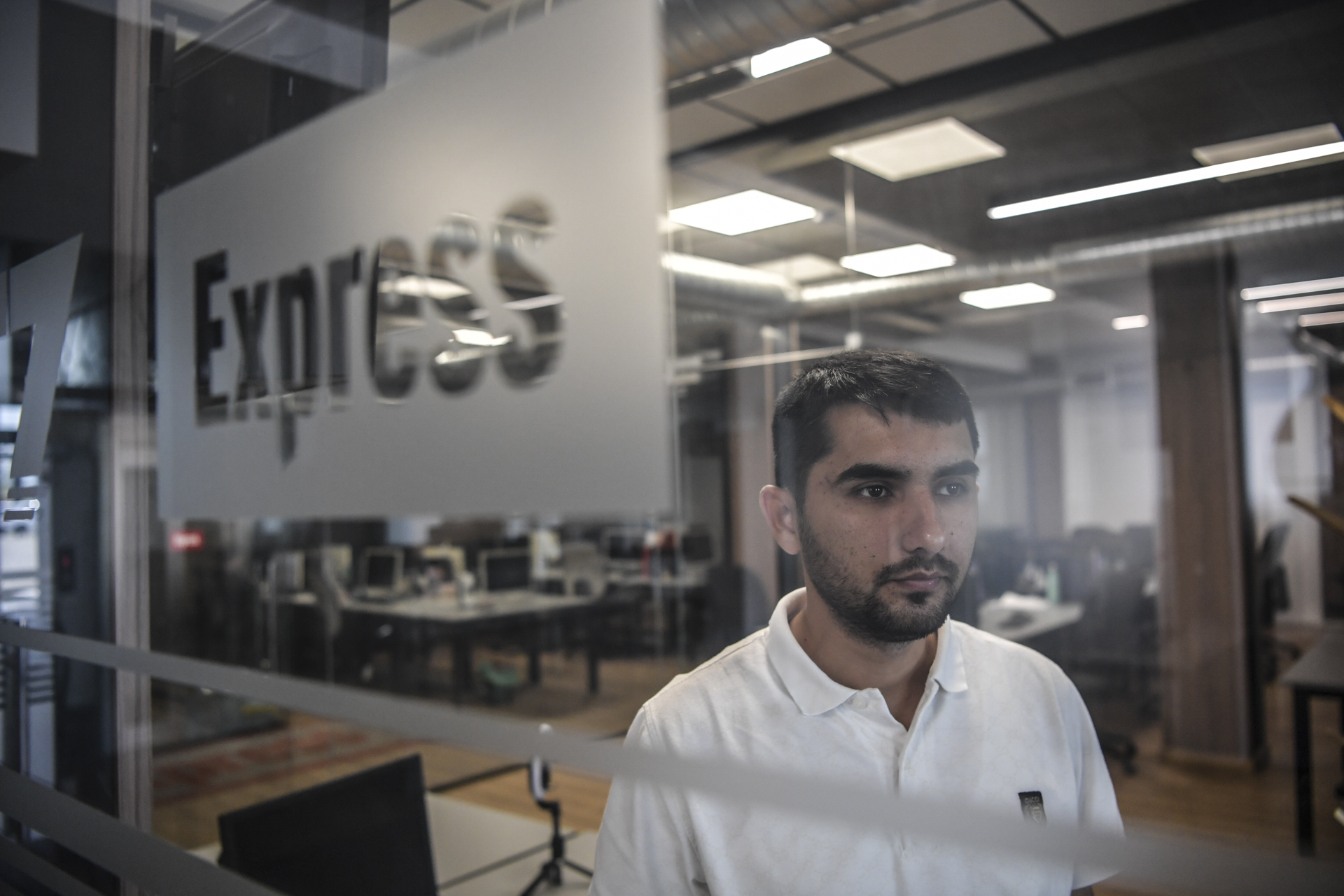
He was troubled by the prevalence of television segments and written reports related to the problems of the communities, which were dominated by images of poverty. Photo: Atdhe Mulla / K2.0
Qerimi said that Lani had told him that they were used to not having journalists from non-majority communities in private media outlets. “I also remember that I told Lani that if you think you should accept me because I belong to the community, I told him: ‘I will not come.’ But he said: ‘Don’t misunderstand, I will not hire you if you’re not professional,'” says Qerimi. Working on television was a new challenge. On his first day, he was accompanied by a fellow journalist. “On the second day, they gave me a cameraman,” said Qerimi.
He was troubled by the prevalence of television segments and written reports related to the communities, which were dominated by images of poverty. “The first frame showed garbage in Fushë Kosovë’s Lagja 28 area. I wanted to change this,” he said.
He has become an important resource for colleagues seeking advice on various topics relating to non-majority communities. His personal experiences and the prejudices against his community have made him more direct with colleagues and increasingly critical of how non-majority communities are treated.
Lani, the editor-in-chief of T7, recommended that Qerimi deal with different topics, regardless of the subject’s ethnicity.
“And this was what I liked the most, just because I belong to this community, doesn’t mean that I should only cover community issues,” said Qerimi.
Qerimi, who once dreamed of playing at Camp Nou while kicking the ball in the backyard of his house in Magure, took on additional responsibility at the television station in April 2024. Besides reporting from the field, he is now T7’s assistant editor.
Feature Image: Atdhe Mulla / K2.0
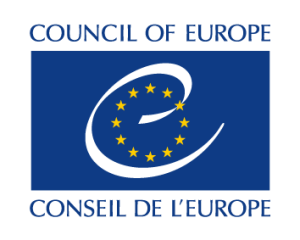
This article has been produced with the financial support of the Council of Europe Project ‘Promoting human rights and non-discrimination principles at the local level’ phase II, financed by UNMIK and implemented by the Council of Europe Office in Pristina. Views expressed herein can in no way be taken to reflect the official opinion of either party.
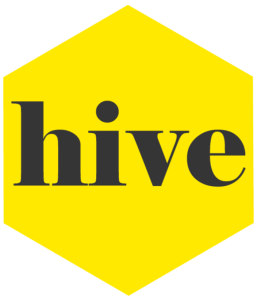 Want to support our journalism? Become a member of HIVE or consider making a donation. Learn more here.
Want to support our journalism? Become a member of HIVE or consider making a donation. Learn more here.











